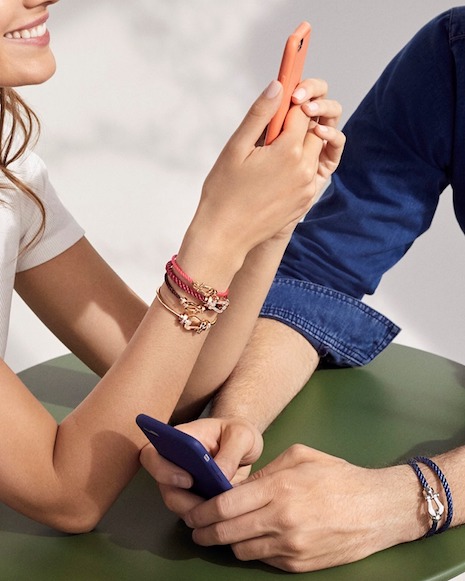 Consumers are drawn to being influencers for the potential for flexible hours. Image credit: Olapic
Consumers are drawn to being influencers for the potential for flexible hours. Image credit: Olapic
The majority of millennial and Gen Z consumers are open to being micro-influencers for brands, creating the potential for brands to broaden their sponsored social media partners. A new report from Morning Consult finds that 61 percent of consumers organically post about the brands and products that they like, and 86 percent would be open to receiving money in exchange for posts. Contrary to the speculation that influencer marketing is reaching a bubble, three-quarters of millennials and Gen Z consumers follow influencers and a significant portion look to influencers for guidance and purchasing decisions. Morning Consult’s report is based on a survey of 2,000 13- to 38-year-old consumers. Social media following Seventy-two percent of millennials and Gen Zers follow influencers on social media, with teens leading the trend. While consumers choose to follow influencers for a sense of voyeurism or aspiration, they say that the most important factor in choosing who to follow is authenticity. Women tend to gravitate towards following influencers on Instagram, while men favor YouTube personalities. YouTube vloggers are also more prominent. When asked to name their three favorite influencers, respondents most commonly listed PewDiePie, Jeffree Star and Shane Dawson. Some of these YouTube celebrities are also more well-known among millennials and Gen Zers than famous faces such as Jennifer Aniston and Serena Williams.
Instagram post from Jeffree Star Social media is a prime source for younger consumers to get inspired. Eighty-eight percent say they turn to social media to learn about products before buying, and 56 percent have bought an item after seeing someone else’s post. Gen Z women are the most apt to say that influencer posts are the number one source they turn to to find new products to buy, with about a quarter naming it their top channel. Despite turning to social media for product suggestions, only 10 percent of consumers say they have a lot of trust in influencers’ product promotions. An additional 47 percent say they have some trust in their recommendations.
 Consumers look to influencers for product inspiration. Image credit: Fred
Friends and family are the most trusted for product advice. However, influencers come out ahead of celebrities for trust.
The biggest factor that can help gain consumers’ trust is that the influencer seems knowledgeable.
Beyond product recommendations, some influencers are becoming the product creators.
As the influencer marketing business grows, personalities are rolling their significant followings into entrepreneurial ventures. But as influencers move from brand collaborator to competitor, what does it mean for luxury brands?
Celebrity-level influencers such as Chiara Ferragni and Jeffree Star have launched brands based on their public personas, tapping into their existing audiences to sell fashion or beauty products. According to a report from Fashionbi, some of these brands have taken off and have drawn an even larger audience than the individuals themselves, pointing to the potential impact of these influencer-led labels (see story).
Micro-influencer opportunity
While consumers are most apt to share aspects of their lives such as travel experiences and event photos, most consumers say that they are at least somewhat likely to organically post about the products they like.
When asked if they would post content promoting a brand for money, 71 percent of women and 62 percent of men said they would do so if they like the product. An additional 16 percent of women and 23 percent of men would post regardless of whether they actually believe in the product.
Consumers also show aspirations to be influencers, with 54 percent saying they would take the opportunity to become an influencer if it presented itself.
The biggest reason that individuals want to become influencers is to make a difference in the world, followed by having flexible hours.
While influencer marketing is a hot topic in social media today, a recent report found that celebrity personalities do not hold as much sway as individuals who are perceived as regular people.
Sprout Social found that 61 percent of consumers would be apt to look into a product after a friend recommended it, compared to only 35 percent who would consider a purchase after hearing about it from an influencer. With consumers responding more to their peers, Sprout sees a big potential for the budget-friendly tactic of using a brand's own employees as influencers (see story).
Consumers look to influencers for product inspiration. Image credit: Fred
Friends and family are the most trusted for product advice. However, influencers come out ahead of celebrities for trust.
The biggest factor that can help gain consumers’ trust is that the influencer seems knowledgeable.
Beyond product recommendations, some influencers are becoming the product creators.
As the influencer marketing business grows, personalities are rolling their significant followings into entrepreneurial ventures. But as influencers move from brand collaborator to competitor, what does it mean for luxury brands?
Celebrity-level influencers such as Chiara Ferragni and Jeffree Star have launched brands based on their public personas, tapping into their existing audiences to sell fashion or beauty products. According to a report from Fashionbi, some of these brands have taken off and have drawn an even larger audience than the individuals themselves, pointing to the potential impact of these influencer-led labels (see story).
Micro-influencer opportunity
While consumers are most apt to share aspects of their lives such as travel experiences and event photos, most consumers say that they are at least somewhat likely to organically post about the products they like.
When asked if they would post content promoting a brand for money, 71 percent of women and 62 percent of men said they would do so if they like the product. An additional 16 percent of women and 23 percent of men would post regardless of whether they actually believe in the product.
Consumers also show aspirations to be influencers, with 54 percent saying they would take the opportunity to become an influencer if it presented itself.
The biggest reason that individuals want to become influencers is to make a difference in the world, followed by having flexible hours.
While influencer marketing is a hot topic in social media today, a recent report found that celebrity personalities do not hold as much sway as individuals who are perceived as regular people.
Sprout Social found that 61 percent of consumers would be apt to look into a product after a friend recommended it, compared to only 35 percent who would consider a purchase after hearing about it from an influencer. With consumers responding more to their peers, Sprout sees a big potential for the budget-friendly tactic of using a brand's own employees as influencers (see story). 